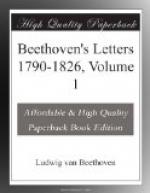To my great comfort, a person has returned here with whom I can enjoy the pleasures of society and disinterested friendship,—one of the friends of my youth [Stephan von Breuning]. I have often spoken to him of you, and told him that since I left my fatherland, you are one of those to whom my heart specially clings. Z. [Zmeskall?] does not seem quite to please him; he is, and always will be, too weak for true friendship, and I look on him and —— as mere instruments on which I play as I please, but never can they bear noble testimony to my inner and outward energies, or feel true sympathy with me; I value them only in so far as their services deserve. Oh! how happy should I now be, had I my full sense of hearing; I would then hasten to you; whereas, as it is, I must withdraw from everything. My best years will thus pass away, without effecting what my talents and powers might have enabled me to perform. How melancholy is the resignation in which I must take refuge! I had determined to rise superior to all this, but how is it possible? If in the course of six months my malady be pronounced incurable then, Amenda! I shall appeal to you to leave all else and come to me, when I intend to travel (my affliction is less distressing when playing and composing, and most so in intercourse with others), and you must be my companion. I have a conviction that good fortune will not forsake me, for to what may I not at present aspire? Since you were here I have written everything except operas and church music. You will not, I know, refuse my petition; you will help your friend to bear his burden and his calamity. I have also very much perfected my pianoforte playing, and I hope that a journey of this kind may possibly contribute to your own success in life, and you would thenceforth always remain with me. I duly received all your letters, and though I did not reply to them, you were constantly present with me, and my heart beats as tenderly as ever for you. I beg you will keep the fact of my deafness a profound secret, and not confide it to any human being. Write to me frequently; your letters, however short, console and cheer me; so I shall soon hope to hear from you.
Do not give your quartet to any one [in F, Op. 18, No. 1], as I have altered it very much, having only now succeeded in writing quartets properly; this you will at once perceive when you receive it. Now, farewell, my dear kind friend! If by any chance I can serve you here, I need not say that you have only to command me.
Your faithful and truly attached
L. V. BEETHOVEN.
14.
TO WEGELER.
Vienna, June 29, 1800.
MY DEAR AND VALUED WEGELER,—




